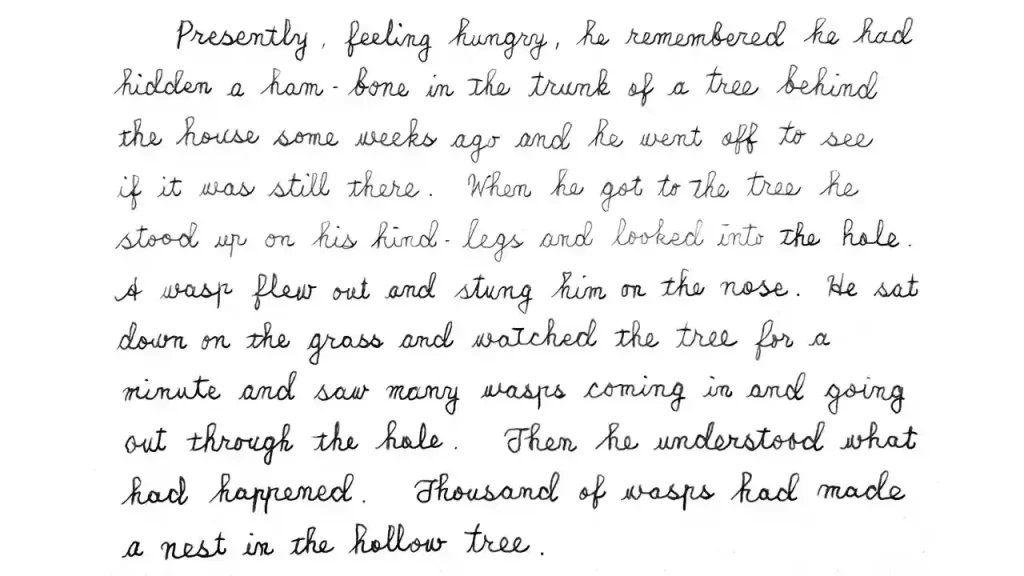Presently, feeling hungry, he remembered he had hidden a ham-bone in the trunk of a tree behind the house some weeks ago and he went off to see if it was still there.
The Story of Mrs. Tubbs
- modifier: すうしゅうかんまえに
- subject: じぶん
- predicate: かくす
日本語訳:
少しして、空腹を感じて、パンクは思い出しました。
そういえば、家の裏にある木の幹に、数週間前にハムボーンを隠したんだ。
彼はそれがまだあるか確かめに行きました。
- 空腹 / kuufuku (くうふく, hunger)
- 隠す / kakusu (かくす, hide)
When he got to the tree he stood up on his hind-legs and looked into the hole.
- subject: パンク
- predicate: のぞきこむ
- modifier: あなを
ハムを隠した木に着くと、パンクは後ろ足で立ち上がって、穴を覗き込みました。
- 後ろ足 / ushiroashi (うしろあし, hind leg)
- 覗き込む / nozokikomu (のぞきこむ, peek in)
A wasp flew out and stung him on the nose.
- subject: ハチ
- predicate: さす
- modifier: はなを
一匹のハチが飛び出して、彼の鼻を刺しました。
- 鼻 / hana (はな, nose)
- 刺す / sasu (さす, stab or pierce)
He sat down on the grass and watched the tree for a minute and saw many wasps coming in and going out through the hole.
- subject: ハチ
- predicate: でいり
彼は芝生に座って、一分間その木を観察しました。
数多くのハチが穴を通って出入りしています。
- 観察 / kansatsu (かんさつ, observation)
Then he understood what had happened.
- subject: かれ
- predicate: わかる
それで、何が起きたのか分かりました。
Thousands of wasps had made a nest in the hollow tree.
- subject: ハチ
- predicate: つくる
- modifier: すを
たくさんのハチが空洞の木に巣を作ったんだな。
- 空洞 / kuudou (くうどう, cavity or hollow)
So he thought of a plan.
- subject: かれ
- predicate: かんがえる
- modifier: けいかくを
それで、彼はある計画を考えました。
- 計画 / keikaku (けいかく, plan)
He went and got a big stick and threw it into the hole in the tree.
- subject: かれ
- predicate: なげいれる
- modifier: えだを
彼は大きな枝を取って来て、それを木の穴に投げ入れました。
Then all the wasps came flying out and tried to sting him.
- subject: ハチ
- predicate: さそうとする
すると、すべてのハチが飛び出して、彼を刺そうとしました。
He went running towards the house with the wasps after him and ran in through the back door of the house.
- subject: かれ
- predicate: いえにかけこむ
彼はハチを引き連れて家の方に逃げていき、裏口を通って家に駆けこみました。
- 逃げる / nigeru (にげる, escape or run away)
- 裏口 / uraguchi (うらぐち, back door)
The wasps kept following him—though a few stopped to sting some of the cats that were hanging about the back door.
- subject: ハチ
- predicate: さす
- modifier: ネコを
ハチたちは彼を追うのを止めませんでした。けれど、数匹が追うのを止めて、裏口でうろついている数匹のネコを刺しました。
Then he ran up the stairs by the front staircase, into the bedrooms and down by the back-stairs.
- subject: パンク
- predicate: かける
パンクは正面階段を駆け上り、寝室に入って、裏階段を駆け下りました。
- 駆ける / kakeru (かける, run or gallop)
In the hall he found Beefsteak-and-Onions, who had just come in from digging potatoes, with a spade in his hand.
- subject: パンク
- predicate: みつける
パンクは玄関でビーフステーキ・アンド・オニオンを見つけました。
彼はポテト掘りから戻ってきたところでした。シャベルを手に持って。
- 玄関 / genkan (げんかん, entrance or front door)
Punk ran between his legs and out through the front door.
- subject: パンク
- predicate: そとにでる
パンクは彼の足の間を駆け抜けて、正面玄関から外に出ました。
Reference : The Story of Mrs. Tubbs by Hugh Lofting(project gutenberg)
English Story With Easy Japanese Translation
